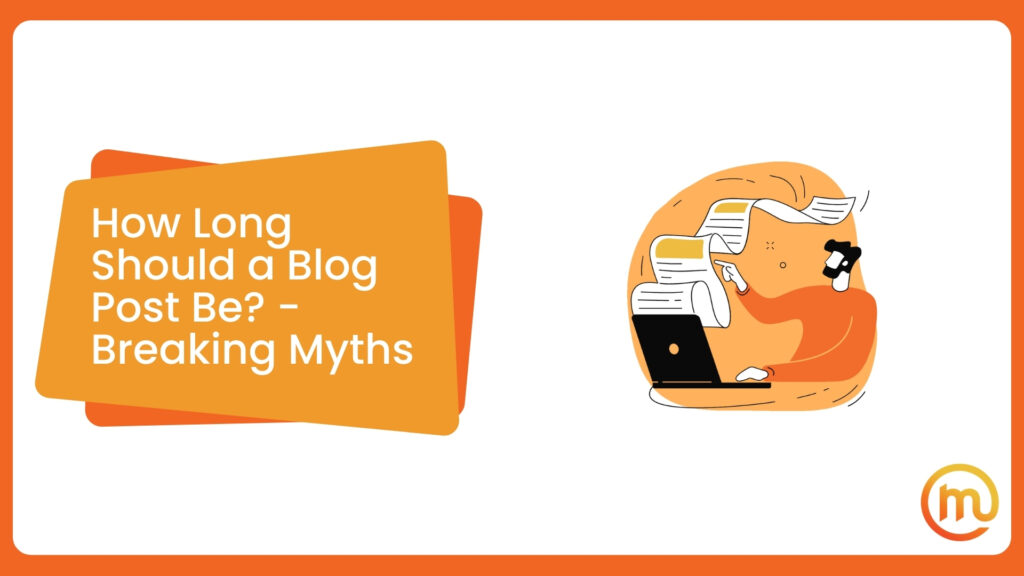If you’re in the world of content marketing, one of the common issues you may have faced is deciding on the right word count for your blogs. How long should a blog post be in order to be engaging and SEO-friendly? If you’re curious to find out, stay with us.
There is no ideal number of words for a blog post. Although there’s a myth that articles don’t need to be longer than 500-600 words, this isn’t true – lengthy posts of 1,500-2,000 words usually have better results. If your text is in this range, users will spend more time on your website (which is good in terms of SEO and ranking), and you will be able to go into the depths of the topic and explain it adequately.
Is There an Ideal Word Count for a Post?
This question has kept many content writers up at night – how many words should a blog post be? What’s the ideal number? There’s a common myth among content marketing professionals that these texts shouldn’t be lengthy – many will tell you that all you need is 500-600 words. We’re here to tell you that it’s time you stop believing this idea.
Lengthy Texts Often Have Better Results
Unfortunately, the exact magic number doesn’t exist – the ideal word count isn’t the same for all blogs and every brand or business. This is a complex issue that depends on many factors, including the SEO practices you implement into your work. Still, all things considered, the experience tells us that longer texts have better results, and by longer, we mean articles that have 1,500-2,000 words. Let’s dive into details and explain what factors you need to keep in mind when creating the perfect article.

How Long Should a Blog Post Be for SEO Purposes – What Affects the Length of a Blog Post
Quality content writing isn’t just about how much there is on a page. Your blogs have to be suited for the right audience, and the length of posts can vary depending on the characteristics of a potential buyer you are trying to reach. Get into the minds of your readers – would they need a detailed explanation of your service or product in order to get interested in buying them? If so, you might want to consider longer blogs so that you can give yourself enough space to say all that needs to be said.
Of course, this all depends on your niche, as some products are pretty self-explanatory and won’t necessarily need many paragraphs to be explained. On the other hand, there are many businesses that need to be marketed with lengthy articles so that readers can properly understand what they would be getting from the business in question.
We must also mention that what you write – and whether it’s longer or shorter – depends on the actual keyword you’re basing your article on. Sometimes, the keyword is a specific phrase that can be explained in 500 or 1,000 words. However, if it’s a broad phrase that you can write endlessly about, you should know that longer content would be better suited in this scenario, not only for the quality of your text but also for ranking on search engines.

Why Opt for Long-Form Posts? Here Are the Benefits
Search engines such as Google are fans of lengthy posts of 1,500-2,000 words, and content marketing strategies will usually focus on them. Long posts are great in terms of SEO, and even though SEO can take a long time, the results will be excellent – you can expect an increase in organic traffic. Let’s talk a bit about the main benefits of the lengthy form.
Users Will Spend More Time on Your Site If the Text Is Lengthy
When Google has to decide what sites to push on the first page of results, it considers numerous factors – and one of the important factors is dwell time. This is a term used to measure how long readers spend on your website. Obviously, if they trust you with their time, that’s a signal to Google that your content is of high quality, and the search engine will push your blogs to rank better.
With this in mind, it’s easy to understand why lengthy posts are good for SEO. They will make a reader stay on your website for a while. Any good content writing agency that provides SEO marketing services can tell you this is good for your business. However, you must provide quality content that will help readers find answers to their questions related to search queries.
You Will Be Able to Go Into Depth of the Topic Adequately
If you’re limited by the small word count, your ability to produce excellent articles is severely limited. Every experienced content writer has struggled to pack a huge amount of information into a small blog at least once in their career. When you have 500 or even 700 words, you can barely scratch the surface of your theme.
Don’t get us wrong – the writing of that length can be good and useful for a reader – but it can’t be an in-depth exploration of topics that covers all of their aspects. It can’t be a how-to article or an ultimate guide to something. Now, when you can use more words, it’s a completely different story. The length of blogs dictates how much freedom you have in writing. Long forms allow you to present more information to the reader and show your style – so you’ll end up with a text of the best quality!

How to Choose the Perfect Word Count?
So, how long should blog posts be in your case? All the theoretical knowledge we’ve talked about in the section above is great, but how exactly will you determine the length of the next text you have to write? You surely want to make it your best post yet, and the next few tips we’ve provided will help you optimize your work properly and show the search engines what you’ve got.
Figure Out the Purpose of Your Posts
Before you can write anything, you should know what type of content you’re aiming for. This can give you an idea of what length you need to go for. There are many types of content – from short press releases (which are usually up to 700 words) to pillar pages on websites (which can go over 3,000). Still, most posts will fall into one of these categories:
- Use cases (500-1,500 words),
- Informational blogs (1,000-1,500),
- Guides (1,500-2,500),
- How-to articles (1,500-2,500).
Keep in mind that these are just guidelines and won’t be enough for you to make a decision. You will have to factor in a few more things that we’ve mentioned below. It’s important not to dwell too much on the guidelines – after all, every article is unique.
Explore the Theme That You Need to Write About
The best way to start working on a text is to do detailed research on the topic you need to write about. The more you read about the theme revolving around your keyword, the better you will be able to create your own spin on it.
Plus, when you know what the text will be about and how much information you have to cover, it’s easy to figure out in how many words you can cover it all. The research is the hard part – after you’re done with that, the text will pretty much write itself.
Make an Outline of the Blog
This is a neat little trick used by all the best professionals. Before you get started on the text, create an outline – this will essentially be the structure of the blog. When you have all the headings and subheadings arranged, it will be easier to write. Every section will have its purpose, and you won’t struggle with figuring out what to say in each section. This will make the final draft a quality read that will keep the reader engaged.
Estimate How Many Words You Can Write Per Heading
All that’s left to do is make an estimate of how many words you can write per heading. This is an individual decision but will mostly be based on the topic you’re exploring in your text. Some headings will naturally require more rows than others. When you add all the estimates into one number, you will finally have your word count.

It’s Not All About the Word Count – Here Are Some Tips on How to Make Your Blogs High-Quality and Well-Optimized
There’s more to the art of content writing than just how much you write – you will have to put a lot of effort into an article if you want it to rank well on Google. We’re talking about a variety of SEO practices that will increase the quality of your text and optimize it. Although there are many tricks that any professional SEO agency would regularly use in their work, we’ve selected a few of the most popular ones – let’s take a look at them:
Make Sure Your Title and Headings Are Engaging
No matter how good the text itself is, it won’t mean much if no one is tempted to read it. You need to make a reader interested in what you have to say. Your title and at least one of the headings should contain the main keyword.
Don’t Overlook the Intro and Conclusion Paragraphs
You shouldn’t jump straight to the point. Give a reader a bit of time to ease into the text. Start with a short intro that will introduce the theme of the text – this paragraph should have less than 100 words. The conclusion is of huge importance as well, as it often contains a call to action that invites the reader to purchase a product or service advertised in the post.
Don’t Write Huge Blocks of Text
Let’s be honest, the attention span of the average user isn’t what it used to be. People simply don’t want to begin reading something that seems to have no end. This doesn’t mean you should shorten your text – just make it visually better. Separate huge paragraphs into two or more smaller blocks of text. We advise to stick to paragraphs that are up to 6-7 rows on a website.
Ensure the Blog Is Visually Appealing
This is an addition to the previous tip. Organizing your text so that it’s separated with elements such as images, tables, and bullet lists is of utmost importance. To make it even more appealing, try bolding the vital parts of each paragraph. Since most people just quickly glance at texts, bolded sections will stand out and keep a reader engaged.
Are You Looking for Content Writing Services? Made Online Is Here for You
If you want to pop up on the first page of Google, you’ll need a reliable SEO marketing agency that knows the ins and outs of content writing – and Made Online is just the agency you need. With expertise and plenty of experience writing about various topics, we can create outstanding blogs that will stand out in the sea of competitors. So contact us to learn more about our services, and let’s create beautiful content together!

